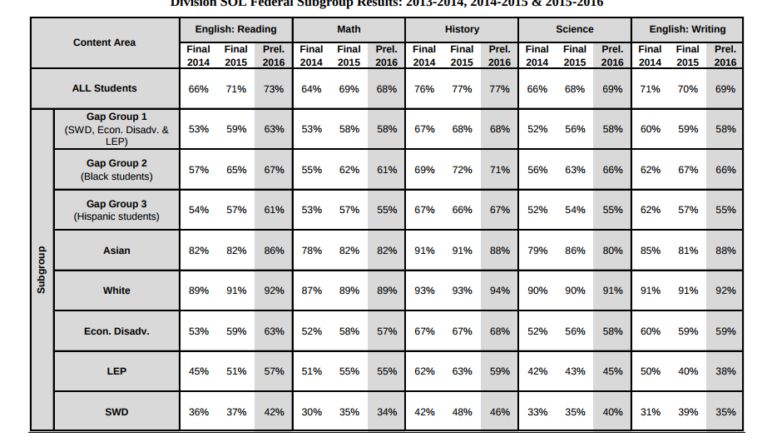By Regan Feld, Zoe Glasser, Margo Wagner
During the 2016-2017 school year, Alexandria City Public Schools’ (ACPS) Standards of Learning (SOL) test score results declined in almost all of its schools. According to preliminary results on the ACPS website, 15 out of 16 schools in Alexandria are at least partially accredited and only 11 schools are fully accredited. In order to become a fully accredited school, schools must perform at or above the state average on their respective math, language arts, science, and history SOL tests. Partially accredited schools, such as T.C. Williams High School and Francis C. Hammond Middle School, did not score markedly below state averages on their math, language arts, science, and history SOLs, but did not score at or above average. Jefferson Houston, the only ACPS school that was denied accreditation, scored markedly below average as a school on their SOL tests, though it should be noted that the school improved noticeably from the 2015-2016 school year.
Despite ACPS’ upward trending SOL scores in the past two years, math and science scores dropped below their 2015 mark in 2016. In 2015, approximately 72 percent of T.C. Williams students passed their math SOL, whereas in 2016 about 67 percent passed. Due to this decline in scores, T.C. is now only partially accredited.
The SOL math scores had the lowest pass rate of the five tests at less than 59 percent, making T.C. one of the lowest performing schools for math in northern Virginia. Writing scores were the second lowest comparatively, followed by history and then science.
ACPS sent a newsletter to students and parents on August 15, 2017 detailing score results. “T.C. Williams remained generally steady across history and science but dropped slightly in reading and math,” the newsletter said. “The pass rate for reading was 69 percent, while math was 54 percent. History remained steady at 74 percent. Writing and science fell slightly to 71 percent and 69 percent respectively. These initial federal results will be recalculated for accreditation purposes in September when the results are expected to be higher. Accreditation information for all schools is scheduled to be released by the Virginia Department of Education on September 13.” Tests scores are now worse than they were in the 2014-2015 and much of T.C.’s progress has halted.
The decline in test scores becomes more concerning when the scores are broken down by demographic. The state of Virginia divides SOL scores into seven subgroups: White, Black, Hispanic, Asian, economically disadvantaged, English learners and students with disabilities. The number of subgroups is then multiplied by the number of tests to create 35 categories of scores (i.e. Hispanic; math). This year only 14 out of 35 scores improved or stayed the same, while every other score dropped.
Hispanic, English learners, students with disabilities and economically disadvantaged students have scored markedly below state averages for the third year in a row. The most noticeable drop was in the scores of Hispanic students, who scored above average on almost all standardized tests administered through ACPS, but scored well below state average on the SOLs. In 2015, about 57 percent of Hispanic students passed the math SOL, while only 55 percent passed in 2016.
Not all SOL scores dropped, however. Five of the seven sub groups showed improvement in reading scores with the rest were static. ACPS has also shown improvement with the black and white subgroups. White students are outperforming the state averages on all five tests and black students are outperforming the state average on two tests and not falling below the average on the other three.
In order to improve SOL results, T.C. plans to focus on strengthening problem-solving skills in math, especially algebra and geometry, while encouraging students to approach math problems creatively and independently to strengthen core skills. They will continue to focus on the Virginia mathematics process goals, including mathematical problem solving, communication, reasoning, connections and multiple representations. Mathematics remains a top priority for T.C. Williams and will undergo a major transformation in assessment development, collaborative lesson planning, data collection and analysis and subsequent re-teaching for students not mastering content or skills.”
Sophomore Sara Rider said, “SOLs are often easier than finals, and the teachers stress how important they are while in reality they aren’t [very important].” Rider passed all of her SOLs.

